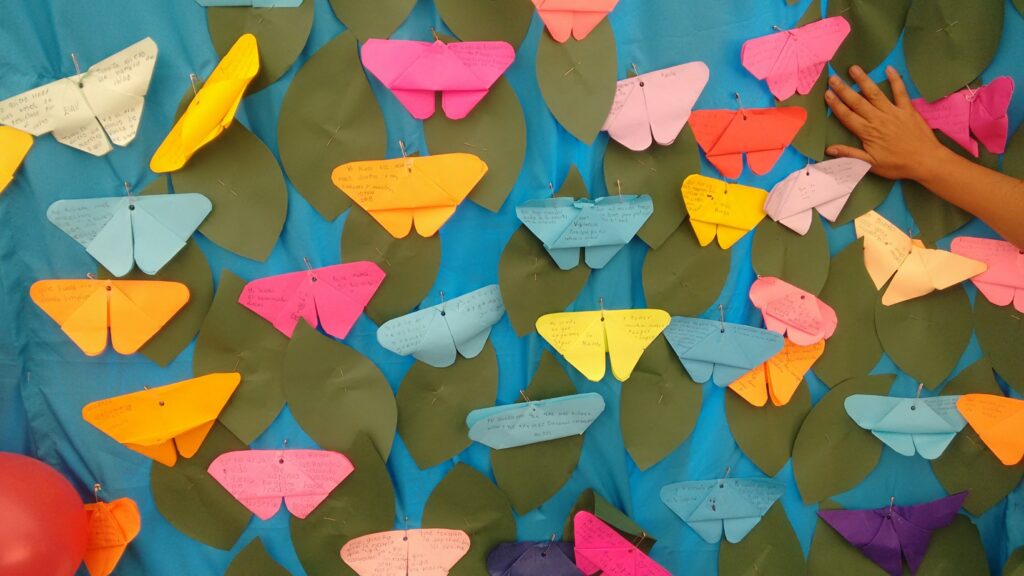Taking into account the recent accusations against the Learning Communities project—accusations that seek to question its scientific foundations and its contributions to educational and social improvement in diverse contexts around the world—we, the members of the Latin American Network of Learning Communities, hereby express our strongest support and solidarity with this project of educational and social transformation. Over time, it has demonstrated a deep commitment to educational improvement, equity, and the active participation of communities in learning processes.
We deeply regret the recent attempts to discredit this valuable initiative by malicious voices that, without foundation or evidence, aim to delegitimize work built on egalitarian dialogue, inclusion, and respect for collective knowledge.
As actors committed to quality education and social justice, we recognize in Learning Communities an approach that has generated real impact since its arrival in 2002 to various Latin American countries. Its perspective, based on dialogic learning and on successful educational actions derived from solid scientific evidence, has enabled us to build more democratic, collaborative, and effective school environments where all children have found multiple opportunities to learn in a dialogic and supportive way.
Over these years, we have witnessed genuine transformations in thousands of schools across a dozen countries on our continent, which has renewed our hope in education as a means to dignify the lives of individuals and communities.
For example, it has become evident how the reading of classical literature became a priority in thousands of rural and urban schools thanks to dialogic literary gatherings. In an equal number of schools, diverse volunteers enthusiastically and altruistically participate in school activities, improving instrumental learning through interactive groups. Schools that have decided to implement the dialogic model of conflict prevention and resolution, through concrete actions such as creating coexistence norms and launching the Zero Violence Brave Club, experience a marked decrease in violent conflicts and improved coexistence among students—and we do not know of a single case where this model has caused harm to anyone.
We have observed profound changes in school leadership, which has shifted from exercising authority based on power to a dialogic and democratic leadership where everyone can be heard. The increase in family participation in schools is undeniable: mothers, fathers, grandmothers, uncles, and others now play an important role and participate actively in school decision-making and learning activities, including the creation of adult literacy spaces in highly vulnerable contexts. Likewise, it is clear how pedagogical optimism has been rekindled in many teachers as they engage in various dialogic training spaces and witness the undeniable effectiveness of successful educational actions in improving their students’ learning in practice. Most exciting of all is seeing how children develop their capacities to the fullest because they can have a voice in different spaces within educational institutions. In this way, it is evident that Learning Communities has improved the dynamics of schools, communities, and families throughout our region.
In times when education requires more bridges and fewer walls, we reject any form of attack that seeks to spread misinformation or hinder the progress achieved by the Learning Communities project internationally. On the contrary, we maintain our hope and reaffirm our conviction that the path toward transformative education must be sustained through collaboration, respect, and the defense of initiatives that place communities and their aspirations at the center, always guided by the best scientific evidence of social impact.
Yours sincerely,
Natalia Linares. Colectivo Acción Dialógica y Red Colombiana de Comunidades de Aprendizaje. Colombia.
Alfonso Rodríguez. Instituto de Investigaciones en Educación, Universidad Veracruzana. México.
María Ocampo. Instituto de Investigaciones en Educación, Universidad Veracruzana. México.
Milton Trujillo Losada. Comité gestor de la Red Colombiana de Comunidades de Aprendizaje. Colombia.
Sandra Santacruz Bravo. Comité gestor de la Red Colombiana de Comunidades de Aprendizaje. Colombia.
Carmen Patricia Castilla. Nicaragua.
Carmen de la Rosa Morales. México.
Claudia Marcela Tamayo. Colectivo Acción Dialógica. Colombia.
Sara Marcela Santa Tobon. Colombia.
Guadalupe Meléndez Pérez. México.
Ramona Navarrete Villanueva. México.
Sandra Ruiz Almendarez. Nicaragua.
Verónica Daniela Hernández Guzmán. México.
Ana María Blanco. Costa Rica.
Verónica Belmont Martínez. México.
Arnaldo Efrain Ek Tuz. Formador de comunidades de Aprendizaje en Yucatàn en Escuelas de Educacion Indígena y Telesecundaria. México.
Gildardo Ramirez Pérez. México.
Germán Hernández. Universidad de Sherbrooke, Canadá.
Adriana Juárez Camacho. México.
Cinthya Elizabeth Vargas Murillo. México. Seminario a hombros de gigantes DGSEI-CDMX. México.
Raúl Enrique Anzaldúa Arce. Investigador UPN Ajusco. México.
Rossana Aviles Torres. Seminario a hombros de gigantes DGSEI-CDMX. México.
Evangelina Landa Bello. México.
Leticia Cruz Gama. México.
Jéssica Berenice Sánchez Ramírez. México.
Brenda Sofía Nájera Sánchez. México
Mariana de los Angeles Guerrero Gómez. México.
Natividad Perea Madrid. México.
Georgina Ahuatzi Oropeza. Directora de la Esc. Prim. Mauricio Matta, Chiautla de Tapia. México.
Belén Aparicio Ibarra. México.
Javier Hernández Natarén. México.
Jader Andrés Cano. Profesional de la Secretaría de Educación de Itagüí. Colombia.
Sandra Rojas Mendoza. Mexico.
María Soledad Gerón. Docente, Vicedirectora NP Formadora en CdeA. Argentina.
Cecilia Sánchez Pérez. México.
Naftaly Suárez Hormiga. Colectivo Acción Dialógica. Colombia.
Bibiana Carreño. Estado de México, México.
José Luis Herrera Díaz. Estado de México, México.
Juan Carlos Leal Hernández. Ciudad de México, México.
María de Lourdes Muñoz Loyola. Puebla, México.
Michael Raid Merano Ponce. San Luis Potosí, México.
Milton López. Nuevo León, México.
Tomás Mendoza García. Nuevo León, México.
Sofía Irais Ramos Terreros. México
Giovanni Muñoz Sagrero. México
Nayelli Valencia Islas. México
Jorge Salinas Cedillo. México
Betsabe Isabel Cruz Cruz. México
Alma Patricia Sampson Avila. México
Luis Eduardo Dirceo Mendez Gómez. México
Salas Alanis José Guadalupe. México
Abigail Cruz Mejía. México
Silvia Navarrete Prado. México
Anabell Montoya Osuna. México
Andrea Duarte Pérez. México
Karin Alejandra Luna Olalde. México
Juan Jonathan Rojas Muñoz. México
Marisol Eugenia Gómez Esponda. México
Ernesto Rosas de la Rosa. México
Balbina Reza Yañez. México
Alma Delia Granados Villarreal. México
Esmeralda Aguado Navarrete. México
María del Rayo Martínez Pelayo. México
Eulalia Ruiz Hernández. México
Carolina. Provincia de Salta, Argentina.
María Guadalupe Díaz Olivas. México
Laura Rodríguez Sánchez. Maestra. Nuevo León, México.
Roseli Rodrigues de Mello. NIASE. Brasil.
Mireya Emperatriz Quiñones. Colombia.
Dr. Mauricio Valdés Pino. Director Colegio Teresiano Enrique de Ossó, Santiago de Chile, Chile.
Anabel Gutiérrez Solís. UDEEI 87 turno vespertino. Ciudad de México, México.
Lic. Irma Auxiliadora Arana Duarte. Directora General, Colegio Teresiano Sagrado Corazón. Nicaragua.
Edith Sorelly Olarte Quiroz. Colombia.
Arelí Suárez Ramos. México.
Jessica Erazo. Colectivo Acción Dialógica. Colombia
Teresa Cruz Castillo. Estado de México, México.
Wendy Salvador Morales. Puebla, México
Sandra Pavez. Chile.
Azucena Patiño Álvarez. Ciudad de México, México
We are a diverse network that brings together actors from seven Latin American countries involved in bringing to the continent the educational transformation project Learning Communities, developed by CREA (Community of Research on Excellence for All). Currently, we support thousands of schools in our countries in implementing successful educational actions based on dialogic learning, which are generating profound educational and social transformations. Our dream is for all children in Latin America to have access to an excellent education that promotes efficiency, equity, and social cohesion.


